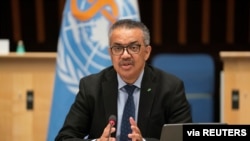The World Health Organization director-general on Tuesday continued to press his case against what he calls "vaccine nationalism,” saying poor countries have had to “watch and wait,” while wealthy nations forge ahead with vaccination programs.
In his closing remarks to the 10-day WHO executive board meeting in Geneva, agency chief Tedros Adhanom Ghebreyesus said, “With every day that passes, the divide grows larger between the world's haves and have-nots."
He said the world faces a "catastrophic moral failure" if it does not work for vaccine equity. He cited recent studies showing how such policies hurt the global economy by leaving some nations behind.
“Vaccine nationalism could cost the global economy up to $9.2 trillion and almost half of that — $4.5 trillion — would be incurred in the wealthiest economies," Tedros said.
The WHO-organized vaccine cooperative programs designed to provide vaccines and COVID-19 treatments to poor nations are facing shortfalls in vaccines and funding. Meanwhile, Tedros said, wealthy nations in some cases have ordered millions of surplus doses.
At the very least, he said, the world needs to work together to ensure that the vaccinations are underway for health workers and older people in all countries within the first 100 days of this year.
“We have 74 days left. Time is short, and the stakes could not be higher. Every moment counts," he said.
